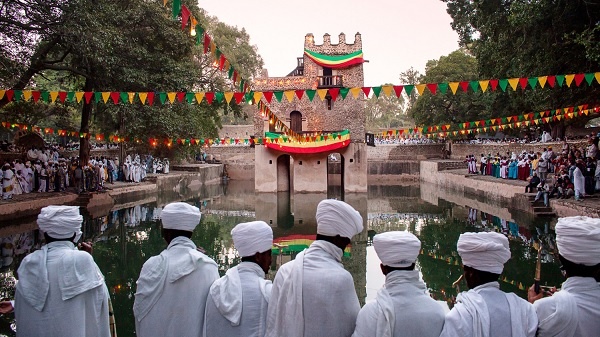
(Semonegna.com) – The United Nations Educational, Scientific and Cultural Organization (UNESCO) on 11 December 2019 inscribed Ethiopian Epiphany as one the Intangible Cultural Heritage of Humanity during the fourteenth session of the Intergovernmental Committee for the Safeguarding of the Intangible Cultural Heritage in Bogota, Colombia (from 9 to 14 December 2019).
Ethiopian epiphany is a colorful festival celebrated all over Ethiopia to commemorate the baptism of Jesus Christ by John the Baptist in the River Jordan (Matthew 3:14 in Bible). The commemoration starts on the eve of the main festival on 18 January. The eve is known as Ketera, which means blocking the flow of water for the blessing of the celebrants. On the eve of Ketera, people escort their parish church tabot (replicas of the Ark of the Covenant) to Timkete-Bahir (a pool, river or artificial reservoir), transported by a priest of the parish and accompanied by a great ceremony. The people spend the night attending night-long prayers and hymn services, including the Eucharistic Liturgy. Hundreds of thousands participate in the actual festival on the following day – 19 January. The celebration starts early in the morning with pre-sunrise rituals. These are followed by the sprinkling of the blessed water on the congregation, as well as other ceremonies. At around 10 a.m., each tabot begins its procession back to its respective church, involving an even more colorful ceremony with various traditional and religious songs. The viability of the element is ensured through its continued practice, with Orthodox clergies playing a pivotal role: they sing the praises dedicated to the rituals and hymns, carry the Ark, and preach relevant texts.
Including the recently added Epiphany festival, Ethiopian has now four Intangible Cultural Heritages inscribed by UNESCO. These are:
- Ethiopian Epiphany / Timket Festival (inscribed in 2019)
- Gada system, an indigenous democratic socio-political system of the Oromo (inscribed in 2016)
- Fichee-Chambalaalla, New Year festival of the Sidama people (inscribed in 2015)
- Commemoration feast of the finding of the True Holy Cross of Christ / Meskel Fesival (inscribed in 2013)
Sources: UNESCO/ Semonegna.com
